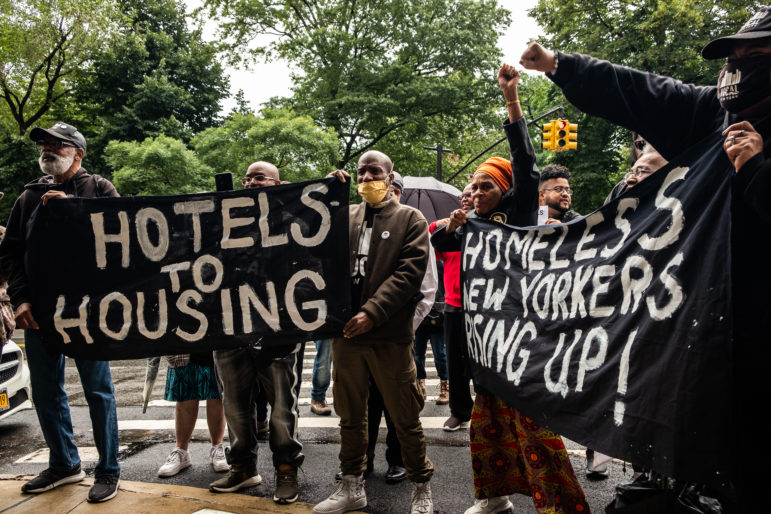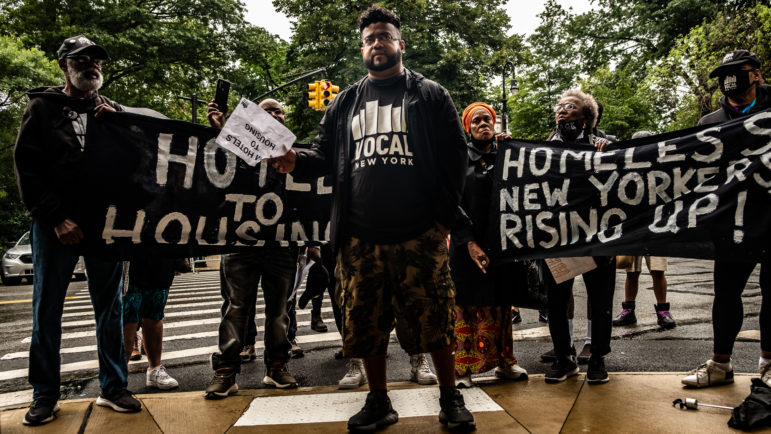Homeless New Yorkers have been bracing for a return to the barracks-style shelters for months. Nonprofit providers and DHS began sending letters as early as March urging homeless hotel residents to discard excess belongings to comply with a “two-bag policy” at shelters.

Adi Talwar
Vocal-NY and New Yorkers experiencing homelessness rallied across the street from Gracie Mansion Monday. Advocates say the city is rushing residents back into congregate shelters.This story was updated at 6:05 p.m. on 6/16/21.
As the devastating impact of COVID-19 became clear last year, Mayor Bill de Blasio and city officials made a crucial decision to limit the spread of the deadly illness among New Yorkers experiencing homelessness.
Starting in April 2020, the Department of Homeless Services (DHS) moved nearly every single adult out of congregate shelters, where people sleep in crowded rooms, and into commercial hotel rooms, typically with just one other person. The moves were hailed by homeless New Yorkers and their advocates, who say the semi-private spaces have helped people avoid COVID while stabilizing other aspects of their lives as they seek permanent housing.
But 14 months later, with the public health crisis ebbing, de Blasio says it’s time to send thousands of homeless adults back to the big shelters. “This is something that’s going to help move us forward,” he told reporters Wednesday, the sort of messaging usually associated with the return of indoor dining and Broadway shows reopening.
The mayor says the city is awaiting approval from Gov. Andrew Cuomo and the state Office of Temporary and Disability Assistance (OTDA) to send roughly 8,000 adults back into shelters by the end of July. He has discussed his goal of returning people back to shelters for weeks, and said Wednesday that DHS asked the state for permission to commence the transfers on May 18.
After this story was published, OTDA and Cuomo’s aide Rich Azzopardi told City Limits that de Blasio does not need state approval to send people back to congregate shelters.
“The city submitted a plan to use pursuant to previous guidance in effect since September. The governor lifted all social distancing guidelines yesterday so the plan is moot,” Azzopardi said. “There’s nothing to approve and they can move forward. The shelters just have to follow CDC masking guidelines, but there’s no stamp they need from us.”
The Mayor’s Office did not immediately respond to emailed questions about Azzopardi’s comments.
Whatever the case, homeless New Yorkers have been bracing for a return to the barracks-style shelters for months, unsure of when the moves will actually take place. Nonprofit providers and DHS began sending letters as early as March urging homeless hotel residents to discard excess belongings in order to comply with a “two-bag policy” at shelters.
Advocates, meanwhile, have questioned the timing of shelter returns since the federal government has reimbursed the city for the emergency hotel rooms, and thousands of homeless New Yorkers have still not received the COVID-19 vaccine.
“Why the rush to put us back in the shelter now when the pandemic is still ongoing?” said Milton Perez, a Parks Department employee who has been homeless for the past five years. “Why the rush to put us in danger?”
DHS told City Limits that 6,000 homeless New Yorkers have received at least one COVID-19 vaccine dose through an initiative administered by the Department of Social Services. Others have likely received their doses at other city and state sites, but the city does not track those numbers. There were 32,634 adults, including parents with children, staying in DHS shelters on June 14, according to the city’s most recent daily census.
Perez, who spoke during a rally outside Gracie Mansion Monday, said he was staying at a 60-bed shelter operated by the organization CAMBA before moving into Brooklyn’s Williams Hotel in April 2020.
He said the setting helped him improve his health by allowing him to prepare his own meals and sleep more soundly. Inside congregate shelters, outside food is prohibited and the man one cot over may spend the night screaming during a mental health crisis, he said.
Perez said he worried about other homeless New Yorkers, like his hotel roommate, a senior citizen with various health problems.
“You’re in the same dorm, a 20-person room, and to the left there’s a person on dialysis. To the right, a person with a serious heart condition,” he said.

Adi Talwar
Milton Perez, a Parks Department employee who has been homeless for the past five years, speaks at VOCAL-NY rally outside Gracie Mansion Monday.Perez and other hotel residents received a letter from DHS Administrator Joslyn Carter on May 26 advising them that the return to shelter was imminent. He showed City Limits another letter he received from CAMBA on his way to work Tuesday.
“The transition can happen any time in the near future,” the letter states, before reminding residents of the shelter’s strict limits on personal belongings and ban on food and drinks.
“The policy of excessive belongings still apply, only 2 bags will be allowed into the facility at the time of re-entry,” the letter reads. “This transition can happen any time in the near future so please start preparing.”
At other sites, like a Times Square hotel that has housed people who previously stayed in a BronxWorks shelter, the letters began as early as March. BronxWorks encouraged residents to “downsize” their belongings to comply with the two-bag rule, according to a letter dated March 17.
DHS said the city has used more than 60 hotels to house adults during the pandemic. A spokesperson said the agency will monitor COVID rates while determining when to send people back to shelters.
“For those New Yorkers who are currently experiencing homelessness, our staff and provider partners continue to do extraordinary and vital work caring for New Yorkers in need under these unprecedented circumstances — and as members of the community, we intend to be good neighbors, engaging openly and making this the best and safest experience it can be for these individuals as they get back on their feet,” the agency spokesperson said.
Advocates, however, say the city is missing an opportunity to move homeless New Yorkers into permanent housing rather than replicating the pre-pandemic shelter crisis.
Coalition for the Homeless Policy Director Giselle Routhier pointed to recently passed legislation that will raise the value of city rental subsidies.
“That’s an opportunity to get people into housing,” she said.
In Albany, lawmakers also voted to increase the state rental voucher, though it is unclear whether Cuomo will sign the measure into law.
Routhier said she worries about a resurgence of COVID-19 among people experiencing homelessness, with at least 30 percent of adults statewide still not vaccinated. “It’s important to recognize that hotels have absolutely saved lives when it comes to stopping the spread of the virus,” she said.
After the Gracie Mansion rally Monday, Shams DaBaron, an advocate who spent years in shelters and hotels before securing permanent housing in February, described how private spaces have enabled more homeless New Yorkers to focus on their health, housing and employment instead of day-to-day survival. He cited his own experience at a large shelter on Wards Island.
“When I first went to the shelter, I was so traumatized it took me three days to take a shower. I felt unsafe, unclean,” said DaBaron, who goes by the nickname Da Homeless Hero. “When I was on the bus to Wards Island, I’d have to drink just to prepare myself. I just knew I couldn’t black out because then I’d get robbed.”
The privacy of a hotel room allowed him and others to concentrate on longer-term needs, he said.
“In the hotel, I could take a shower. I didn’t feel like someone was going to rob me,” he said. “Dignity goes a long way. Safety goes a long way.”








